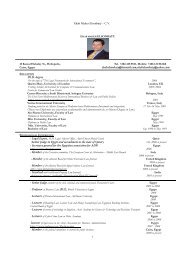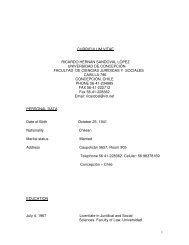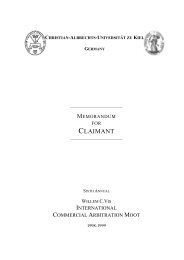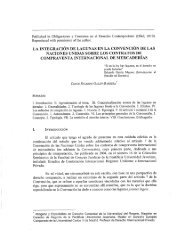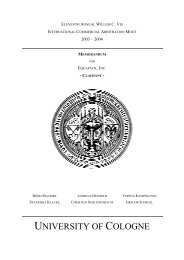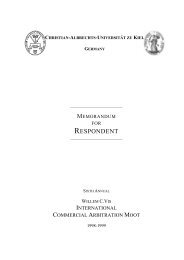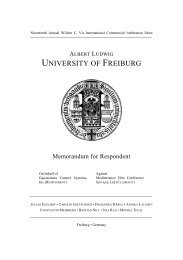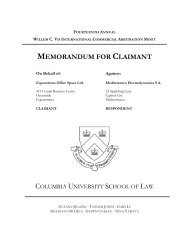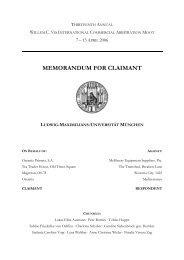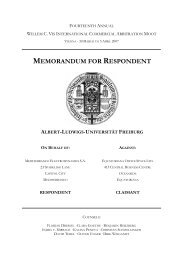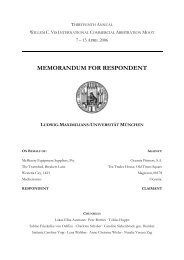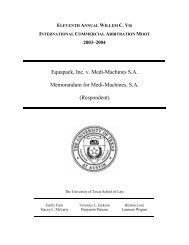MEMORANDUM FOR RESPONDENT - Pace University
MEMORANDUM FOR RESPONDENT - Pace University
MEMORANDUM FOR RESPONDENT - Pace University
You also want an ePaper? Increase the reach of your titles
YUMPU automatically turns print PDFs into web optimized ePapers that Google loves.
QUEEN’S UNIVERSITY FACULTY OF LAW<br />
mackerel found an examination nearly identical to Claimant’s to be unreasonable. Mackerel, like<br />
squid, is a “predominant” bait for long-liners in Mediterraneo [Req. for Arb. 7]. Frozen mackerel<br />
were delivered from multiple catch seasons but the buyer only sampled boxes from one season.<br />
The court found the buyer should have examined boxes from all seasons [Sergueev v. DAT<br />
(Denmark 2002)]. Similarly, Claimant should have examined cartons from both 2007 and 2008<br />
seasons. Had it done so, Claimant would have discovered the non-conformity. By failing to<br />
examine a random or sufficiently large sample of the Squid, Claimant failed to discharge its duty<br />
under art. 38(1) CISG and discover the non-conformity on 1 July 2008.<br />
2. Claimant did not exercise the requisite degree of diligence in its examination.<br />
93. Claimant failed to reasonably examine the Squid by not exercising the degree of diligence<br />
required in the circumstances. The adequacy of an examination under art. 38(1) CISG depends<br />
on the circumstances of the case [DiMatteo 362]. Here, two circumstances compelled a rigorous<br />
examination. First, where a buyer has previously purchased non-conforming goods from a seller,<br />
subsequent purchases require a more diligent examination [Ferrari 192; LG Aug 1989]. Although<br />
the Contract was the first transaction between the Parties, Claimant knew that Danubian squid<br />
were “not consistent in quality” [Req. for Arb. 11-12; Cl. Ex. 10 4]. Given that knowledge,<br />
Claimant was required to perform an especially diligent examination. Second, perishable goods<br />
for human consumption have been held to require rigorous examination [Schwenzer in<br />
Schlechtriem/Schwenzer 2010 613; Kingfisher v. Comercial (Spain 2007)]. Here, the Contract required<br />
the Squid be “fit for human consumption” [Cl. Ex. 4], a requirement on which Claimant insisted.<br />
However, far from being especially diligent, Claimant examined only squid from the 2007 catch,<br />
and defrosted only 0.025%, or USD 80 worth of squid, from a delivery worth USD 320,000 [Cl.<br />
Ex. 4]. This examination cannot be considered diligent. By failing to examine a reasonable<br />
sample or exercise the requisite degree of diligence, Claimant failed to discover the non-<br />
conformity when it ought to have done so.<br />
B. Claimant did not give notice of the non-conformity until 16 August 2008,<br />
which was not within a reasonable time under art. 39(1) CISG.<br />
94. Claimant alleges that it gave notice of the non-conformity on 29 July 2008 [Cl. Memo. 70].<br />
However, Claimant did not provide notice sufficient to satisfy art. 39(1) CISG until 16 August<br />
2008, after the reasonable notice period had expired. Art. 39(1) CISG requires the buyer to<br />
provide the seller notice, specifying “the nature of the lack of conformity” within a “reasonable<br />
time” after the non-conformity was or ought to have been discovered. Claimant did not give<br />
notice specifying the nature of the non-conformity until 16 August 2008 [1]. Notice 45 days after<br />
28



